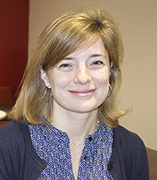Excellence in Teaching: Victoria Trinder
Each year, UIC honors some of its most dedicated and outstanding teachers with the Award for Excellence in Teaching. The winners, who receive a $5,000 salary increase, are selected by past recipients of the award from nominations made by departments and colleges.
Victoria Trinder
Coordinator, Urban Elementary Education
Clinical associate professor, curriculum and instruction

Years at UIC: 11
What does it mean to win an Excellence in Teaching Award?
At our specific urban R1 institution, it is an honor to be recognized in a community of such teaching and scholarship excellence. I believe the best teaching is collective and communal, and that any recognition of singular effort is a reflection of a thriving collegial learning community. Because we do not teach for awards, I am most grateful for this recognition as a communication of my good fortune to be in this place and this time with these colleagues serving our past and present students.
What do you teach?
As program coordinator of the large BA in Urban Education program, I have the great fortune to teach the key transitional and foundational course for every student moving from content coursework into the pre-professional sequence of pedagogy and field-based courses. In my sections of this course, where students begin to integrate and interweave their knowledges of critical pedagogies with fieldwork-based urban teaching practices and critical analyses of the racialized structural inequities of urban public schools, I serve to highlight the importance of students’ first two years of learning and prepare them for the application of advanced interdisciplinary pedagogy coursework in partnership with local classroom professionals. Supporting the emerging critical frameworks in future justice-oriented teachers demonstrates the long-term impact of UIC’s College of Education on teacher preparation in local, national, and global contexts.
How do you engage students in your courses?
Our collective instruction of students in courses and program curricula is deeply responsive to students and the complex identities they bring with them to our endeavors. Centering indigenous knowledges as represented in all our partnered learning spaces supports engagement of students as ownership of developing as city leaders and concretizes a critical foundation for life-long learning. In formal and informal learning activities, I engage students in interweaving shared academic and intellectual discoveries, in community-focused learning collaborations, and in the development of their own personal and professional critical frameworks and sociological analyses of the brilliance and resilience of local urban communities.
What do you enjoy most about teaching at UIC?
An unabashed fan of our university and the people that comprise it, I see my opportunity to teach here as the best version of my professional, personal, and justice-focused mission. Nothing in my work has brought more intellectual, political, and professional challenges to my life, and my gratitude for our urban R1 institution is unending.
What are your research interests?
My research interests include critical analyses of educational philosophies and histories as explored inside colonial logics and systems. Critical race scholarship around curriculum, pedagogy, history and philosophy of education, and the colonial project of U.S. schooling informs my scholarship as manifested in curriculum and program design, as well as action research with teaching partners.
What is your advice to students considering a teaching career?
Committing a life to teaching is one of the deepest and most profoundly selfless acts one might make, as it reflects a life of public and private critical engagement with oneself and communities as they contribute to broader historical moments that contextualize education and schooling. One’s participation in formal education is a complex and contested role, and our community of learners helps establish the core knowledges in learning at all levels. Selecting this path communicates to the world at large, and to students and communities we serve, that true learning is liberatory, and that schools must push toward a better justice and education for everyone.
